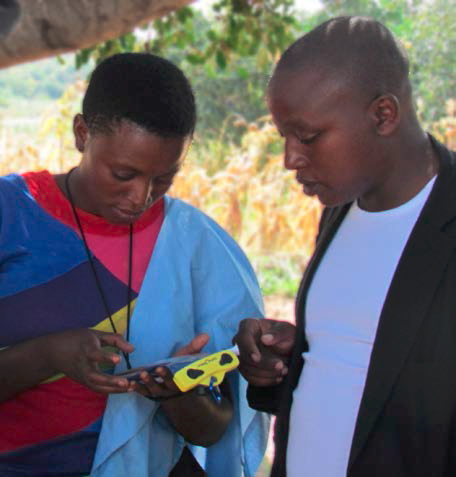
In Tanzania, USAID is building the capacity of local youth to map and record land rights through the Mobile Application to Secure Tenure (MAST) pilot project. The MAST pilot is testing the viability of an innovative participatory, “crowdsourced” approach to capturing land rights information using mobile technology. The first phase of the project is nearing completion in Ilalasimba, a village of 325 households in Iringa Rural District.
Centrally important to this process are local youth, who are trained to capture geospatial data and information about households and householders’ tenure rights using the MAST application on smartphones. These youth serve as “Trusted Intermediaries” for their community. Rather than having outsiders measure land parcels and record rights, youth from the community collect this data, working alongside other villagers who help to resolve disputes and verify claims. The goal is to enhance trust in the process, build skills, and support local systems.
Trusted Intermediaries are trained on the provisions of Tanzania’s land laws, with a special emphasis on women’s rights to land. Following this training, these young women and men learn to use the MAST mobile application. Training takes place over four days and involves District Land Office (DLO) personnel and members of Ilalasimba’s Land Adjudication Committee (LAC). Out of a pool of fifteen, eight youth in Ilalasimba were selected based on their enthusiasm and proficiency with the technology: four were women and four were men.
In just under three weeks these ambitious young people mapped 937 parcels—all of the household parcels in the village. To put this in some context, the DLO issued approximately 1,000 CCROs between 2004 and 2010 and 10,000 between 2010 and 2014. Working in agricultural fields, on wooded hillsides, and around ravines, the Trusted Intermediaries mapped, on average, 55 parcels a day. The data they collected was then uploaded to a cloud-based database and validated by DLO officials. Once data was validated and confirmed by village leaders, the DLO will print Certificates of Customary Rights of Occupancy (CCROs)—formal recognition of land rights.
In May 2015 Jackline Nyantalima, a 23-year old Trusted Intermediary said this about her experience with MAST: “I was trained on land rights. Before this many people did not understand the importance of land and their rights in land. This work has importance for our society and I am happy to be a part of this process.”
Jackline and her fellow Trusted Intermediaries will play another important role, as MAST expands to two new villages they will help to train and mentor the next groups of Trusted Intermediaries. By sharing their experiences and their ideas about what worked well and what did not work well with the MAST process, these young people are helping to strengthen this pilot.

